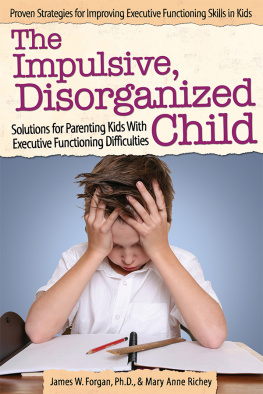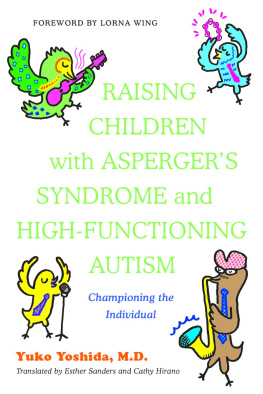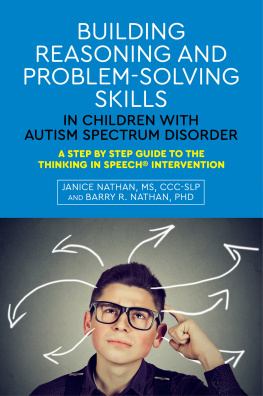


Dedication
Jim dedicates this book to his supportive family.
Mary Anne dedicates this book to her grandchildren, Maxwell and Matthewsources of unspeakable joyand to her husband for his tolerance, support, and great proofreading skills.

Acknowledgements
Projects like this require the work of many individuals and wed like to thank our editor Lacy Compton at Prufrock Press for her guidance, Jodi MacNeal for her expertise, Emily Forgan for her research, and our spouses for their loving support. We are grateful to the professionals in the community who shared their expertise, especially Dr. Jill Kelderman, Ph.D., Board Certified Clinical Neuropsychologist, for her contribution on concussions in children.
Copyright 2015 Prufrock Press, Inc.
Edited by Lacy Compton
Layout design by Raquel Trevino
ISBN-13: 978-1-61821-403-4
The purchase of this book entitles the buyer to reproduce activity pages for individual use only. No other part of this book may be reproduced, translated, stored in a retrieval system, or transmitted, in any form or by any means, electronic, mechanical, photocopying, microfilming, recording, or otherwise, without written permission from the publisher.
At the time of this books publication, all facts and figures cited are the most current available; all telephone numbers, addresses, and website URLs are accurate and active; all publications, organizations, websites, and other resources exist as described in this book; and all have been verified. The authors and Prufrock Press make no warranty or guarantee concerning the information and materials given out by organizations or content found at websites, and we are not responsible for any changes that occur after this books publication. If you find an error or believe that a resource listed here is not as described, please contact Prufrock Press.

| Prufrock Press Inc.
P.O. Box 8813
Waco, TX 76714-8813
Phone: (800) 998-2208
Fax: (800) 240-0333
http://www.prufrock.com |

Table of Contents

Introduction
As parents of our own children with executive functioning difficulties, we wrote this book to provide you with information you can apply right away to help your child. Executive functioning is a broad term used to describe how the brain organizes information to help children think before acting, consider consequences, plan, organize, focus, remember, and sustain effort. (In our discussions throughout the book, we will sometimes refer to executive functioning as EF.) If your child has weak executive functions, he may be impulsive and say things without stopping to think. She may do her homework, but forget to turn it in. His or her room is a mess and completing daily tasks like brushing teeth take constant reminders. Tears are shed, and not just from your child. All of this effort leaves most parents feeling exhausted.
His or her difficulties are not just at home but also occur in school. Your child may be forgetful, easily distracted, off task, or have organizational difficulties. Your childs body is present in school but sometimes you may wonder where his or her mind is during school hours. She comes home without her assignments. Sometimes its like he has not been taught the material because you have to reteach it. Your childs teacher recognizes the difficulties and may even ask you for suggestions.
We offer support and encouragement that you can make a long-term difference in your childs life by learning about executive functioning and being mindful of how you can help your child on a daily basis. Executive functioning is developmental in nature and providing the right kinds of intervention can improve skills. Helping children with executive functioning difficulty is multidimensional. Success is achieved with a combination of your support, teacher understanding, and your childs effort. In this book, we provide help for parents, teachers, and children in many ways, including these:
 We offer parents strategies to help design the home environment to promote success.
We offer parents strategies to help design the home environment to promote success.
 In each chapter, there is a page of teacher strategies you can copy and give your childs teacher.
In each chapter, there is a page of teacher strategies you can copy and give your childs teacher.
 Your child will learn skills by relating to characters in childrens books.
Your child will learn skills by relating to characters in childrens books.
We want to help you help your child by engineering the environment to support your childs success. Youll find proactive steps within a three-point framework, which includes:
1.scaffolding support,
2.teaching systems of support, and
3.sustaining strengths.
This framework implies youll help your child without enabling him or her. Your child will learn systems and routines that contribute to independence. You will build upon your childs natural strengths and talents. When a child with an executive functioning difficulty receives this type of support, he can work to fulfill his potential. We have tried to make the research on executive functioning understandable and usable while sharing our personal and professional experiences in helping children learn to approach their tasks with more purpose and confidence.
Executive functioning difficulties show up in how your children function at home, at school, in the community, as well as in social relationshipsall areas we have covered in each chapter. Although there is no universal agreement on which activities of the brain are executive functions, we have chosen to cover the ones most often included:
 holding back impulses;
holding back impulses;
 keeping information in working memory;
keeping information in working memory;
 shifting, being flexible, and regulating emotions;
shifting, being flexible, and regulating emotions;
 focusing and monitoring;
focusing and monitoring;
 organizing;
organizing;
 managing time;
managing time;
 taking action;
taking action;
 sustaining effort; and
sustaining effort; and

Next page

















 We offer parents strategies to help design the home environment to promote success.
We offer parents strategies to help design the home environment to promote success.